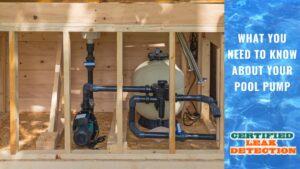
The pool pump is the heart of your swimming pool. While you count on it to run dependably, it needs regular maintenance in order to do so – as well as for you to recognize signs of trouble, and ultimately be able to tell when it’s time to buy a new pump. Although we at Certified Leak Detection do not service pool pumps, we want you to get the most out of your slice of Central Florida paradise every day possible! The following facts and tips about pool pump care and troubleshooting will help you extend the life of your pump – and could even prevent expensive-to-repair damage!
Pool Pump Maintenance Basics
Because practicing good pool maintenance throughout the year is essential, be sure to include the pump on your checklist. The good people at Platinum Pools list these steps to keep it running in top condition:
- Moisture and lubrication are important for a fully functioning pump, even in the off-season. Moisture leaks from seals or pipe joints, which need to be repaired to prevent bearing failure and external damage. Keep the motor itself dry. Also, make sure the bearings are permanently lubricated to prevent the motor from overheating, which can cause critical failure of the whole system.
- Air circulation around the motor is essential for optimal operation. Even if you have a pool pump cover, make sure there is enough ventilation and free airflow around the pump to cool the motor.
- Cleaning the internal mechanics of the pump shouldn’t be a problem if your pump is protected from the elements. However, you can use a clean paintbrush or dust broom to brush away any buildup from the vents. For surfaces and the motor, use a damp cloth to wipe, but avoid direct moisture on the motor (flooding can cause permanent damage). Clean the basket and filter regularly to avoid debris buildup.
- Consider shelter. These days there are plenty of shelters to box away the pool pump, filters and fixtures for a tidier look, as well as aiding protection for your pump. Opt for a material that is rust and rot-proof, and with a lockable hatch so it’s pet and kid-safe. Depending on the space available, you can choose from transportable pump boxes, small sheds and sheltered covers – but provide ample ventilation. Keep pool chemicals well away from the pump, as the fumes can corrode the internal part of the motor.
- Schedule an annual checkup by a pool maintenance professional to make sure everything is running as it should be. The best time to do this is typically in spring so you can guarantee friends and family a safe swim.
Common Pool Pump Issues
With Florida’s swimming season stretching over most of the year, your pool should be in top-notch condition at all times. Pool pumps can develop leaks, as well. Our blog post – “Does Your Pool Pump Have a Leak?” – addresses this topic in detail. Manning Pool Service identifies common red flags indicating other issues that need immediate attention:
Loss of prime – This condition means that enough water is not flowing through the pump. This can occur due to low water levels in the pool or heavy debris in the skimmers, causing them to suck air. It can also happen due to a suction leak from a breach in the plumbing on the suction side of the pump. If a pump runs “dry” for too long it can overheat, burning up the motor and generating enough steam to melt plumbing, shrink pump baskets, and destroy seals and impellers.
A professional pool repair company will add water to your pool, clear out your skimmer baskets, and replumb the pump in case of suction leaks. They will then reprime your pump to make it function again.
Clogged impeller – This is the part of the pump that moves the water. A clogged impeller can severely limit water flow throughout the system, and could burn out the motor. The typical cause is large debris such as sticks, small toys and mulch that make it past the pump basket.
A pool service professional can clear the impeller by spinning it by hand while down siphoning water from the filter. Other times, it may be necessary to take the pump apart to manually clean out the impeller.
Broken pump pot basket – This part keeps debris from clogging the pool’s impeller and pump. Replace immediately whenever cracks or breaks occur. Lack of maintenance can lead to a broken basket. It is extremely important to perform regular pool maintenance, and this includes regularly cleaning the pump pot baskets in your pool. A pool service professional can replace the basket.
Burned out/seized motor – Pool pump motors are continuous-duty outdoor rated motors, but they will eventually wear out and break down. However, poor maintenance and improper operation lead to the conditions that cause premature motor failure – including running the pump dry, failure to perform regular filter cleaning or necessary repairs, and improper water balance.
In this situation, a pool service professional can replace the motor if the rest of the pump assembly is in good condition. If not, the entire pump must be replaced.
How to Tell When It’s Time to Repair or Replace Your Pool Pump
Even if you take the very best possible care of your pool pump, it may need repair at some time – and will need to eventually be replaced. Always Clear Pool Cleaning provides this list of signs to look for:
It’s getting old – Pool pumps last around eight to 12 years on average before needing replacement. It is normal for parts to wear out over time. Moreover, with great advancements in pool pump technologies, pool pumps now use less energy compared to their predecessors. This is made possible by the variable speeds that you can dial up and down, depending on your needs. However, if you have an older fiberglass pool pump, you can replace it with a more variable-speed pump. Although these pumps may cost you more they will save you from huge expenses in the future.
It’s noisy – A pool pump should run quietly and not disturb your peace or your neighbors with grinding, unpleasant noises. Any out-of-character noises may be early warning signs that your pool pump is not working properly. Loud screeching or grinding sounds usually indicate the motor is starting to fail. This is usually due to rust from water getting in from a leaky shaft seal. A pool service professional can determine if the motor needs to be replaced, or the entire pump.
The pump keeps shutting off – If your pump continuously shuts off on its own, it can be a warning sign that the motor is reaching too high of a temperature, and it restarts after cooling down. This problem needs to be diagnosed by a pool service professional as soon as you notice it in order to prevent the pump from breaking down completely. A failing pump component will only grow worse over time, so delaying repairs almost always results in the need for a replacement.
It is losing suction – Your pool pump draws in, filters water, and then pumps it back to the pool. If you feel that your pool pump has started to lose suction, you check the pressure gauge on the filter. If the pressure gauge reads 10 PSI or above the normal pressure, you need to clean your filter. However, if the pressure reads lower than normal, it can indicate a clogged pool pump, leaking air on the suction side, or not a well-primed pump. This will eventually wear out the motor, requiring a pump replacement.
The Take-Home Message
However beautiful your swimming pool is, all of the fun and recreation it provides depends directly upon the ability of its pump to function properly and dependably. Our pros at Certified Leak Detection have over 30 years of experience in detecting leaks in pools, spas and fountains, using industry-leading technologies. As mentioned earlier, we don’t perform swimming pool maintenance, but we want everyone to get the most from their pool! Maintaining your pool’s pump will help you do just that! Plus, the more involved you are with your pool’s upkeep, the more aware you’ll be of conditions that may indicate a leak.
Serving areas throughout Central Florida – including Orlando, Longwood, Lake Mary, Sanford, Kissimmee, Clermont and Winter Springs – our team is ready to answer your call.
Contact us for quick, reliable service!

